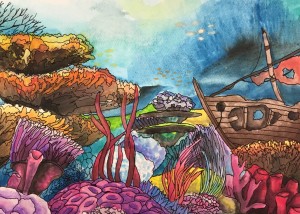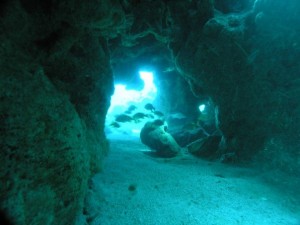Just keep swimming: teacher dives into studies
The ocean remains one of the most undiscovered places in the world. The vast worlds the ocean offers, from coral reefs to open sea, covers more than 70 percent of the world’s surface. It is no wonder Dory tells Marlin to “just keep swimming” in Finding Nemo. That is a lot of water to cover considering ninety-five percent of the ocean remains a mystery.
Science teacher Nicole Collins was not daunted, however, and dove into pursing her passion in Marine Biology. Before becoming a chemistry and Earth Science teacher, Nicole Collins’ days were spent in the Florida Keys researching coral. However, to get to that point, Collins attended Indiana University, even though it did not have a huge marine biology program; it took Collins an extra semester to graduate due to her focus in her major.
During college, Collins studied abroad in Queensland, Australia at the James Cook University—the world’s largest university for marine biology located on the Great Barrier Reef. The summer programs she participated in opened doors for opportunities, according to Collins. She landed a job at the National Oceanic and Atmospheric Association (NOAA) in the Florida Keys, where Collins spent two years researching coral recruitment and artificial reef systems.
“For the artificial reef systems, I was really studying ship wrecks. We would see what kind of substrates we could sink, mostly shipwrecks, in order to get corals to recruit since there is a lot of degradation of the coral with people destroying it,” Collins said. “Coral will attach to any hard, clean substrate, so we sunk the U.S.S. Spiegel Grove, which is a World War II vessel once it became a historic ship after 50 years.”
To receive conclusive results about what substrates corals attach to, Collins went on dives to measure the corals’ growth rate. Being able to summarize the research and receiving good results is one of the most rewarding parts, Collins said.
“Being able to come to a final conclusive answer [about coral growth rates] and help the environment that way really is gratifying and self-fulfilling,” Collins said. “You see a lot of people in college who do research and they never get conclusive results in the field and they can’t figure out what the problem is or a solution to something. It’s really great being able to resolve issues.”
After a few years of research, Collins decided to go into teaching with a concentration in science and brought techniques she used at NOAA into the classroom.
“I thought it’d be really great to bring that research aspect into teaching and really do a lot of labs and teach the kids how to use good research methods as well,” Collins said.
Even though Collins is not currently active in marine biology any more, she still ‘keeps swimming’ as Dory would say. She goes scuba diving and is planning on earning her dive master certification for better dives; all she has left is earning her rescue diver certification. She encourages students to purse what they love.
“Whether it’s marine biology or whatever the students are interested in, just really follow your passion,” Collins said. “You will be successful no matter what you do as long as you stick to your gut, follow through with what you want to do. Really, you guys can achieve anything.”

